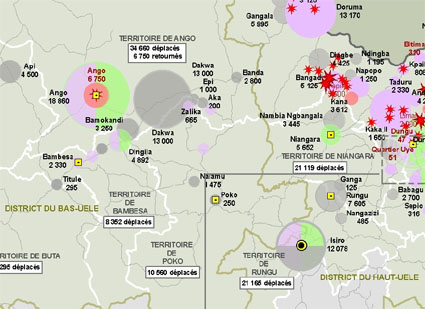Click for full map.
In April, the force commander for the U.N. peacekeeping mission in the Democratic Republic of Congo, General Babacar Gaye, visited the small town of Dingila in the isolated northeastern corner of Congo. The U.N. has a base there, but it’s the only presence the U.N. peacekeeping mission, or MONUC, has in the entire Bas Uele district, where the Lord’s Resistance Army’s frequent attacks have gone largely unreported. Accompanied by the regional leader of the Congolese army, Lieutenant General Gaye announced that the peacekeepers in Dingila will leave by the end of this month.
The withdrawal of the Dingila peacekeepers is part of a larger MONUC troop drawdown planned for this summer, as requested by Congolese authorities and approved by the Security Council late last week. The Congolese government asserts that the Congolese army will be able to adequately fill the security vacuum created by the departure of the U.N. peacekeepers.
The U.N. peacekeepers in Dingila have managed to offer some stability south of Uele River. The peacekeepers have also contributed to providing security for thousands of internally displaced people escaping LRA attacks in Ango territory on the north side of the Uele River. In response to the U.N.’s planned withdrawal, civil society leaders in Dingila sent a memo to the MONUC that expressed their strong concern that the departure of peacekeepers would not only threaten the fragile security in the area but may compel humanitarian groups to pull out. They asked for MONUC to deploy in other parts of the district, especially in Ango territory, that have been regularly targeted by the LRA.
Attempting to alleviate concerns during his visit to Dingila, MONUC force commander Gaye said that he is “convinced that the FARDC troops, deploying with a maximum of support and with good chiefs leading the company, which will be based here, will certainly handle things in the same way that the 321st battalion did in Equateur, that is to say, by displaying professional behavior.” However, Gaye’s statement does not reflect reality, given the well-known inability of Congolese soldiers to provide security, and their penchant for attacking civilians.
Congolese troops in the wider district of Bas Uele (where Dingila and Ango are located) have engaged in looting and harassment of the local population. One of the U.N.’s own internal reports describes the behavior of 18 Congolese soldiers currently serving in Dingila. The report said that there were 59 reported cases of sexual violence believed to be perpetrated by Congolese troops between May and July 2009 in Dingila. Twenty-nine of the rapes were perpetrated against internally displaced people. “From the moment [FARDC troops] arrived, they set up two checkpoints on the periphery of the city and started to extort from the locals,” the report said.
In the neighboring district of Haut Uele, the army’s behavior has been notoriously unprofessional and abusive. Instead of repulsing LRA attacks, Congolese soldiers have consistently engaged in attacking the same people they are supposed to protect. In a recent report titled “Between a Rock and a Hard Place: LRA Attacks and Congolese Army Abuses in Northeastern Congo,” Enough documented hundreds of cases of beatings, looting, killings, and rapes perpetrated by FARDC soldiers against the civilian population. There were 116 reported cases of rapes committed by Congolese soldiers, for instance, in one small Haut Uele town for the month of October 2009 alone.
Furthermore, Enough’s own research calls into question even the example Gaye held up as a model during his remarks in Dingila. As Gaye mentioned, the army’s 321st battalion responded to a rebellion last December in Equateur province. Some of the troops sent to the town of Dongo in Equateur province and to nearby Bondo town in Bas Uele came from the battalion “Ours,” a large force that was stationed in the town of Bangadi in neighboring Haut Uele before deploying to Dongo and Bondo. Commanded by a former militia fighter, soldiers from “Ours” were frequently accused by residents of Bangadi of abuses. A Bangadi resident told Enough in December 2009, “Living with [“Ours” soldiers] has been like living with a viper.” Mentioning the plan to deploy the “Ours” battalion to Bondo, the man added, “Someone needs to alert the population of Bondo about what they are getting.”
Indeed, someone should have alerted the populations of Bondo and Dongo. A recent Reuters report showed that the behavior of Congolese soldiers towards civilians in Equateur province, contrary to Gaye’s statement, has been highly abusive. Titled ‘Fearing own army, DR Congo refugees remain abroad,’ the article explains how Congolese refugees from Equateur province living across the border in the Republic of Congo refuse to return home, fearing abuses by the Congolese army. A Congolese refugee quoted in the article said, “Some of us who tried to return home were attacked by the army, some of our wives were raped by them.”


